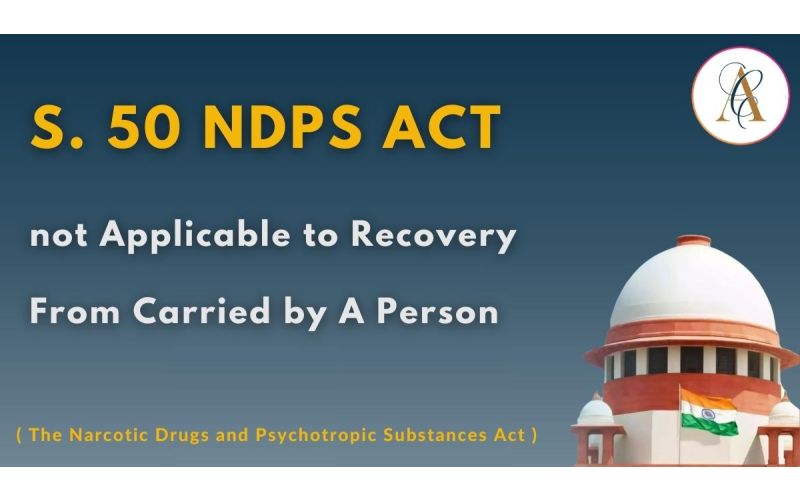S. 50 NDPS Act Not Applicable To Recovery From Bag Carried B

S. 50 NDPS Act Not Applicable To Recovery From Bag Carried By A Person: Supreme Court
The Supreme Court recently reiterated that the conditions for personal search as specified in Section 50 of the Narcotic Drugs and Psychotropic Substances Act are applicable only for the search of the physical body of the person and not for the search of any bag carried by the person.
At the same time, the Court acknowledged that confining the applicability of Section 50 NDPS Act only to the physical body and excluding a bag carried by a person can defeat the purpose of the provision, which is to provide a safeguard against abuse of powers by the investigating agency during a search operation.
However, the Court said that it has to go by the plain language of the provision. A two-judge bench comprising Justices MM Sundresh and JB Pardiwala observed :
"It could legitimately be argued that the interpretation of Section 50 restricting its scope only to the search of a person of the accused would frustrate the object as the apprehension of the person concerned may continue to subsist that he may still be implicated by the police or any other person for more stringent punishment of carrying commercial quantity by getting rid of the rigor of the mandatory provision of Section 50 by implanting the contraband in a vehicle, bag, etc. accompanying the person."
Nevertheless, the bench added that it was bound by larger bench decisions which interpreted the plain language of the section to hold that Section 50 was applicable only to the person.
The judgment, made extensive reference to various precedents which laid down different interpretations of Section 50. One strand of decisions took a strict view to hold that the provision is applicable only to the search of the person. However, over a period of time, this Court started reading the word “person” in a slightly broader sense so as to mandate that Section 50 be complied with even while conducting a search of anything that is inextricably linked to the accused. As a result, a bag which was being carried by the accused was considered to be inextricably linked to the accused, and therefore, any recovery of a contraband from such a bag.
In view of the cleavage of opinions, the matter was referred to a larger bench, which in State of H.P. v. Pawan Kumar reported in (2005) 4 SCC, which held that the term “person” under Section 50 would mean a natural person or a living unit and not an artificial person i.e., a bag or a briefcase.
Pawan Kumar also stated the Constitution Bench judgment in State of Punjab v. Baldev Singh, (1999) 6 SCC 172 showed that "the provisions of Section 50 will come intoplay only in the case of personal search of the accused and not of some baggage like a bag, article or container, etc. which he may be carrying."
Thus, in Pawan Kumar the larger Bench while answering the reference in no uncertain terms stated that “a bag, briefcase or any such article or container, etc. can, under no circumstances, be treated as body of a human being. They are given a separate name and are identifiable as such. They cannot even remotely be treated to be part of the body of a human being.”
However, in in Dilip v. State of M.P. reported in (2007) 1 SCC 450, a contrary view was taken to that of Pawan Kumar, by acquitting accused citing non-compliance of Section 50 for seizure from a scooter. Dilip was followed in certain subsequent cases too (eg : SK. Raju alias Abdul Haque alias Jagga v. State of West Bengal reported in (2018) 9 SCC 708).
However, in State of Punjab v. Baljinder Singh(2019), a 3-judge bench held that non-compliance of Section 50 will not invalidate recovery from a vehicle. Baljinder Singh also held Dilip to be not a good law. Baljinder Singh was followed in the 2021 decision Kallu Khan v. State of RajasthanSimilarly, in a 2022 judgement, the Supreme Court in Dayalu Kashyap v. State of Chhattisgarh , held that an extended view of Section 50 cannot be given to include a polythene bag containing narcotics being carried by the accused.
Rhe 2-judge bench, in the instant case, observed that a view could be taken that an object a person carrying could be regarded as part of the body. However, the bench added that the plain language of Section 50 leaves no scope for any interpretation other than the view propounded in
"However, in view of plain and unambiguous statutory provision, there is no scope of interpreting Section 50 in any other manner than the interpretation explained in Baldev Singh (supra) and Pawan Kumar (supra)." stated the judgment.
In the present case, the Court was dealing with an appeal against a judgment of the Himachal Pradesh High Court, which held that Section 50 NDPS Act was not applicable to the recovery from a bag.
"...the High Court was also correct in saying that Section 50 of the NDPS Act was not required to be complied with as the recovery was from the bag." the Court held dismissing the appeal.
Post Categories
Featured Posts
Latest Posts
Latest Posts

Estate Planning and Succession Laws for NRIs A Comprehensive Guide...
Estate Planning and Succession Laws for NRIs A Comprehensive Guide Estate planning is not just a necessity it's a critical step in securing your family rsquo s future ensuring the seamless transfer of assets and minimizing legal complications For Non-Resident...

SC On Aadhaar Important Takeaways From The Recent Verdict...
The Supreme Court ruled that Aadhaar the ambitious public scheme that uses biometric data to generate unique identification numbers for citizens is constitutionally valid but with conditions Here are the key takeaways from today rsquo s verdict Read More nbsp...

Why Is CARA Delaying Adoption Process Supreme Court Calls For Prompt Action To Benefit...
The Supreme Court on Friday raised serious concerns over the delays in the adoption process and the potential impact on both aspiring parents and children in need of loving homes The remarks came from a bench comprising CJI DY...

Private Class Student Eligible To Take NEET Says NMC Supreme Court Allows MBBS Admission...
The Supreme Court recently allowed a candidate who passed Class as a private student to take admission for MBBS course after NEET counselling This was after the National Medical Commission informed the Court that as per the latest Graduate...

Contract Law in the Digital Age How E-Contracts Are Transforming Legal Agreements...
In today's fast-paced technology-driven world traditional paper-based contracts are swiftly being replaced by electronic contracts or e-contracts This shift is transforming the way legal agreements are created executed and enforced Here rsquo s an in-depth look at how e-contracts are...

Digital Arrest Navigating Cyber Crime Laws in India...
In today's digital era the concept of digital arrest has taken center stage reflecting the evolving legal response to cyber crimes in India With the rise in online fraud hacking cyberbullying and identity theft the need to protect citizens and...

Speak With Our
Get a Appointment
















